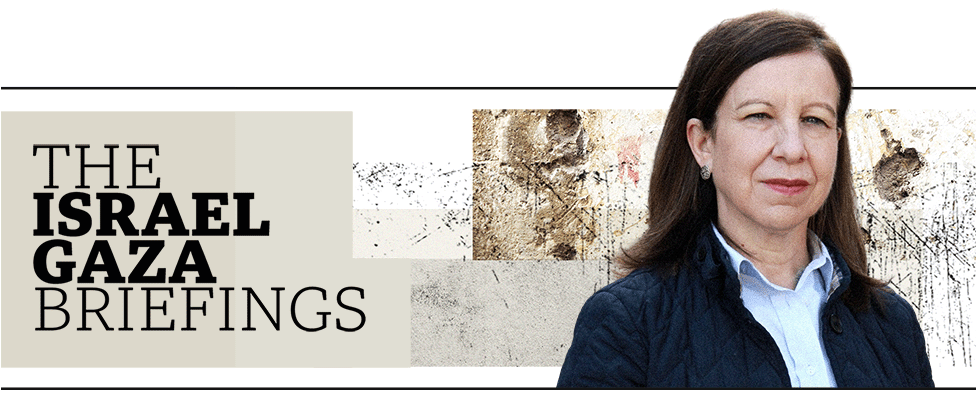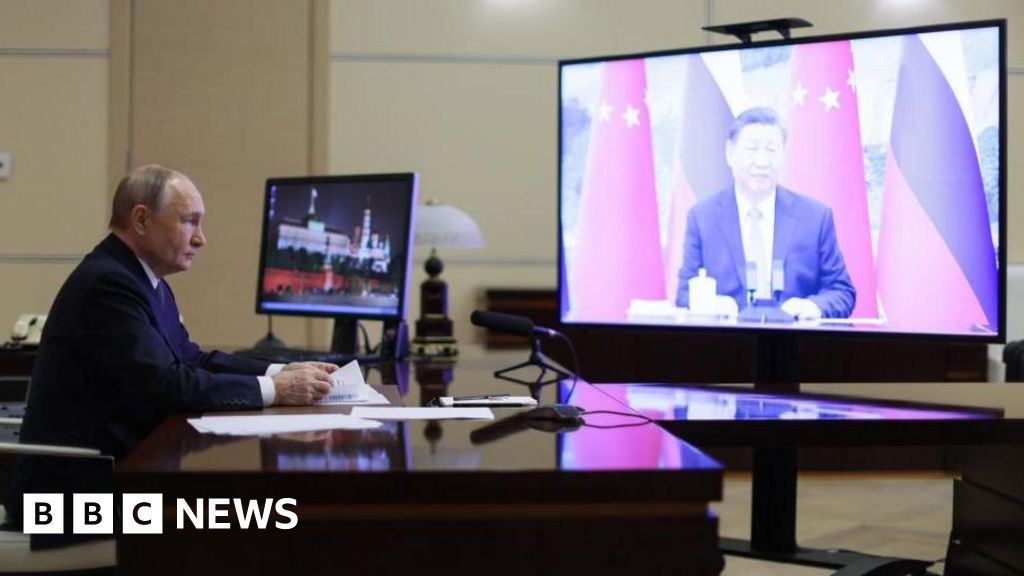ARTICLE AD BOX

By Lyse Doucet
Chief international correspondent
In the wars within wars of this grievous Gaza crisis, the most explosive of all is the searing official enmity between Israel and Iran.
It's now at its most perilous point.
And this region, and many capitals beyond, are watching and waiting with bated breath to see what Iran does next.
It's Tehran's move after the airstrike on its diplomatic compound in the heart of the Syrian capital, Damascus on 1 April, which killed senior commanders in its Islamic Revolutionary Guards Corps (IRGC).
Israel never admits carrying out such attacks, but everyone knows it was its doing.
Image source, AFP
Image caption,Onlookers check the car in which three sons of Hamas leader Ismail Haniyeh were reportedly killed in an Israeli air strike
And since the Israel-Gaza war erupted six months ago, Israel has ramped up its targeting of Iran, not just destroying arms supplies and infrastructure in Syria, but assassinating senior IRGC and Hezbollah commanders.
"We will make them regret this crime and other ones like it, by God's will," warned Iran's Supreme leader Ayatollah Ali Khamenei.
His vow triggered an immediate Israeli retort in an escalating war of words. The two regional powerhouses have been at daggers drawn ever since Iran's 1979 revolution made hostility towards the "Zionist regime" a core tenet of its doctrine. For many years, Israel has conducted targeted killings, mounted cyber operations, and sounded alarm bells about the Islamic Republic's nuclear ambitions as well as its backing for militias, including Hamas, who threaten Israel's destruction.
"If Iran attacks from its territory - Israel will respond and attack in Iran," declared Israeli Foreign Minister Israel Katz in a post on X, formerly Twitter, tagging the Supreme Leader, a most modern of way to communicate for countries with no diplomatic ties.
Then the United States - Israel's staunchest ally and Iran's most powerful adversary - weighed in, putting Iran on notice that it could also face the wrath of the world's mightiest army. "We will help defend Israel and Iran will not succeed," US President Joe Biden proclaimed, hinting that US intelligence was indicating an attack "sooner rather than later".
Image source, AFP
Image caption,Israeli army troops stand around their tanks in an area along the border with the Gaza Strip
"The US could be trying to force Iran to recalculate and reconsider its options right now," reflects Dr Sanam Vakil, director of the Middle East and North Africa programme at the London-based Chatham House think tank.
American media, quoting unnamed US sources, have spoken of possible maximalist scenarios involving a major Iranian assault against Israeli targets, with a wave of drones and missiles, including ballistic missiles.
"The US may be using this messaging to amp up anticipation, so if Iran can't deliver it, it shows its weakness, " says Dr Vakil in a nod to the unsettling uncertainty of this moment.
Iran, which has long prided itself on playing a long game, responding to any provocations with "strategic patience", now faces a choice of all choices. Every option is riddled with risk.
Its aging Supreme Leader Ayatollah Ali Khamenei has to give a green light to a counterattack which placates its militant IRGC commanders who shape Iran's foreign policy. He also has to preserve Iran's perceived prestige as the pivot of the "Axis of resistance" of its armed allies and proxies; they've been emboldened and empowered by their limited but still lethal attacks in this Gaza war.
But this choice also has to be carefully calibrated to avoid sparking a dangerous escalatory spiral. If it pulls in formidable Israeli and American fighting power into this vortex, it could have catastrophic consequences for the Islamic Republic.
Image source, Reuters
Image caption,Palestinians hold Eid al-Fitr prayers by the ruins of al-Farouk mosque in Rafah, in the southern Gaza Strip
The ailing 84-year-old Supreme Leader assumed his mantle in 1989, one year after the punishing Iran-Iraq war which took the lives of as many as 200,000 Iranians. It still casts a long dark shadow.
"Avoiding war is essential to his legacy," points out Iranian analyst Esfandyar Batmanghelidj. "Whatever the retaliation against Israel, it will be designed to avoid a full-scale war."
But this moment is uncharted territory.
The precise missile strikes earlier this month smashed the consulate annex next to Iran's embassy, and killed several IRGC officers including Brigadier General Mohammad Reza Zahedi, its top general in the region in the Quds Force, the elite clandestine branch responsible for foreign operations.
And it happened on Iran's diplomatic property, which Iran considers its own soil.
Image source, Reuters
Image caption,Palestinians hold Eid al-Fitr prayers by the ruins of al-Farouk mosque in Rafah
For many years, Israel has waged what it calls the "war between wars" - strikes on arms shipments, installations, and routes in Syria said to be used by Iranian operatives and their allies, including their most prized and powerful proxy, Lebanon's Hezbollah militia. But in recent months it has upped the ante, exploiting opportunities for targeted assassinations during these turbocharged tensions of the Gaza war.
Iran's response, so far, has been to mainly hit back through its proxies. The shadow wars stretch from hostilities along Israel's northern border with southern Lebanon, a Hezbollah stronghold, through Iran-affiliated militias in Iraq and Syria which have struck American targets, and Yemen's Houthi rebels now attacking shipping lanes in the Red Sea.
In January, after a suspected Israel airstrike in Syria killed IRGC military advisors, Iran did respond directly. But it chose what were seen as "soft targets" less likely to provoke a major retaliation: ballistic missiles fired into northern Iraq against what was described as a base of Israel's Mossad spy agency; and missile and drone launches against Baloch separatists operating across its border in neighbouring Pakistan in another show of force to show its readiness to act. Both sparked outrage and, in Pakistan's case, a retaliatory airstrike from a traditional ally, but tensions soon eased.
Image source, AFP
Image caption,A woman cries over the grave of a loved one at the start of the Eid al-Fitr festival at a cemetary in Rafah in the southern Gaza Strip
In the midst of this current crisis, minds in Iran as well as in Israel are concentrated not just on this risky tit-for-tat, but also on the more fundamental issue of deterrence. Both sides want to send the clearest of signals to the other that such consequential strikes would be costly, and best avoided in future.
For Iran, under pressure at home from unprecedented protests spearheaded by women over restrictions on freedom, and financial hardships, preserving the Islamic Republic is paramount. But it also wants to safeguard its growing sway across the region, and the extensive political and military network its built over many decades.
Its options range from direct raids on military targets in Israel, more distant operations against its embassies and interests somewhere in the world, or retaliating through its proxies again. A report by the well-connected Amwaj media cited the Occupied Golan Heights in northern Israel - land seized from Syria in the 1967 war - as a "prime target" and less risky choice.
Image source, AFP
Image caption,Palestinians carry belongings as people fleeing conflict leave their homes in the Nuseirat refugee camp in central Gaza
Israeli expert Raz Zimmt, Senior Researcher at the Institute for National Security in Tel Aviv, believes Iran will act forcefully. "The patience of Iranians has run out in the face of setbacks blamed on Israel," he posted on X.
Iran seized a commercial ship with links to Israel early on Saturday morning, but Mr Zimmt said Tehran is unlikely to consider this an "appropriate response", adding: "It could afford it additional time to reconsider its next course of action."
But there's no agreement among Iran watchers about what action it will eventually take. And there's a risk too that what Iran views as a cautious calculated act, could be seen as, or end up as, an incendiary miscalculation.
"It does appear that Iran prefers to respond directly," Ali Vaez of the International Crisis Group told the BBC. "I don't think Iran wants to sacrifice Hezbollah or bring it into the fray. It is the top of its spear, and Iran wants to preserve it."
There is also the option of biding its time, at least for a while, to strike when its least expected rather than in the eye of this storm.
"There's an anticipation that Iran will respond, but doing nothing could be an option," says Dr Vakil of Chatham House. "There is a choice on the table where Iran doesn't play into what could be an Israeli provocation."
Image source, AFP
Image caption,Children sit in a swing as they celebrate on the first day of the Muslim holiday of Eid al-Fitr in the central Gaza Strip
Prime Minister Benjamin Netanyahu, under immense political pressure at home, has long argued for military action against Israel's arch-enemy, and is known to have been pulled back from the brink on at least one occasion.
Behind the scenes, there's been an intense flurry of urgent messaging between the US and Iran, conveyed through third-parties including multiple Arab states, to avoid the all-out war nobody wants. Iran sees that, in itself, as burnishing its image as a regional heavyweight which matters.
In this wait and watch moment, airlines have stopped flights, embassies have shut, or warned their citizens to leave Israel. The US has deployed its warships to strategic positions to reinforce its protection of American and Israeli troops, and it's strengthened its air defences to shield its forces deployed in Iraq and Syria.
Israel, and countries across this region, are on high alert for something to happen somewhere.

 9 months ago
60
9 months ago
60








 English (US) ·
English (US) ·